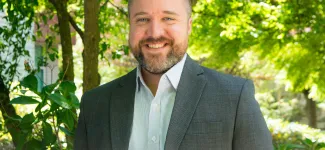Dr. Gabriel Potvin, Chair of the Engineering stream at Vantage College, believes that engineers have a crucial role to play in addressing global and humanitarian challenges, and has taken steps to ensure aspiring engineers develop the technical, leadership and communication skills necessary to translate their innovative ideas into reality.
How we train engineers to think and communicate as leaders is a key component of what we have to address in engineering education, says Dr. Potvin.
“Engineers have a big role to play when it comes to solving large-scale global challenges, like climate change and food and energy insecurity. Although not sufficient on their own, a necessary and inevitable part of the solution to these challenges is going to come from science and engineering,” says Dr. Potvin.
When he’s not teaching in the Department of Chemical and Biological Engineering, Dr. Potvin teaches engineering content courses at Vantage and actively collaborates with language instructors associated with his courses, which integrate technical engineering education and academic English in the Vantage One Engineering curriculum.
Vantage College admits students who are academically very strong, but who do not meet the English language admission standard required to enter the University of British Columbia as a direct to Faculty-entry student.
Developing academic and technical communication skills is a challenge for most engineering students, and that challenge is made more approachable through active collaboration and mutual support between Vantage’s Academic English Program instructors and technical instructors—including Dr. Potvin—who put in extra hours and effort to ensure students are supported in their core education.
Through an interdisciplinary approach to train engineers to be better communicators and leaders, students learn engineering content with integrated language enrichment focusing on engineering deliverables such as lab reports, oral presentations, and research papers—all within the specific context of what students are covering in class at that time.
This gives students the best of both worlds. By providing an engineering education supported by a language course designed specifically around the core engineering course, students have a fuller understanding of how to communicate within the context of engineering concepts.
The language instructor does not have an engineering background and is therefore learning the technical content for the first time, and the content instructor likewise does not have formal language instruction training. This type of collaboration not only enriches and improves both courses, but gives way to meaningful pedagogical discussion.
In the same vein, iterations of assignments and changes to how lectures in the core content courses are delivered is not uncommon as the two instructors dive deeper into learning how best to support their students’ learning on both fronts.
“In engineering, you first start with learning how the universe works, how it’s composed of matter and energy and the laws of nature that govern them. Then, you use that understanding of the universe to develop new applications to make the universe do what you want it to do,” says Dr. Potvin, a staunch advocate of improving the training of engineers through the integration of interdisciplinary approach as a means to encourage students to be more involved as engineers in their fields. “Engineering provides an extremely powerful toolbox that, in conjunction with social elements and interventions, allow us to tackle difficult problems and stretch the limits of what we consider to be possible.”
Dr. Potvin’s passion for outreach in science and engineering started when he was a graduate student, and has continued to this day. He is also involved in research in interdisciplinary education, international education, and project- and problem-based education. His work in science and engineering outreach and excellence in teaching have won him numerous awards, including—most recently—the Ron Britton Engineering Education Vanguard Award from the Canadian Engineering Education Association, which was awarded in Ottawa in June 2019.
You can read Dr. Potvin’s bio here.
